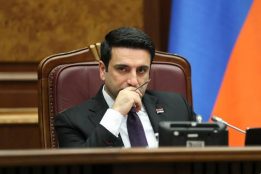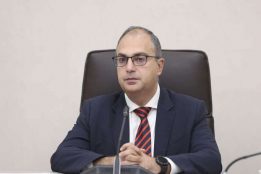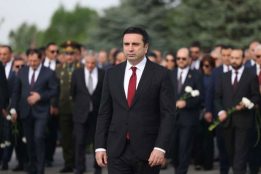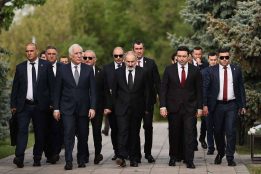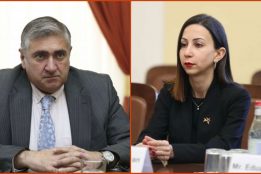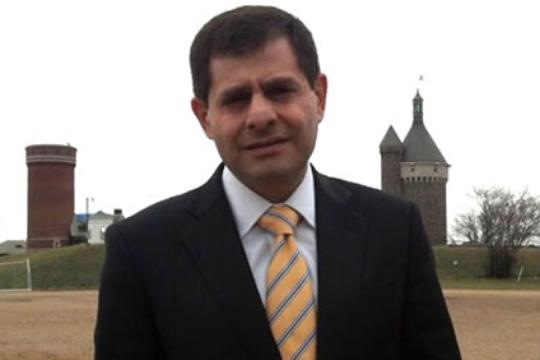
“First Armenian News and Analyses interviewed Armen Kharazian, former member of Armenia’s diplomatic service, and analyst on security affairs, based in Washington, DC.”
There is a widespread perception that while people in Armenia and Ukraine faced similar challenges in opposing the pressure of the Kremlin to join the Russia-led Customs Union, U.S. and EU offered strong support to the opposition in Ukraine, but not in Armenia.Whywas Ukraine more important?
Hardly was one was more important than the other. Simply, public outrage in Ukraine over the decision bythat country’s authorities to clip its European aspirations and join the Russia-led Customs Union was far more robust and vigorous than in Armenia. Unlike the Ukrainians, the Armenian public at large took a somewhat more subdued, less vigorous position against Russia’sresurgent neo-expansionism. Armeniansfailed to assert their European identity and aspirations fora future in Europejust as forcefully as the Ukrainians did.
Where one expects support, it is helpful to have and articulate clearpolicy goals, and to be prepared to advance them, regardless of whether any such support is forthcoming. Unlike Ukraine, Armenia demonstrated very little of that ability. How is the world supposed to understand what the people of Armenia want, when neither the public nor political parties succeeded in denouncing, in clear terms, thepolitical U-turn that the Armenian government made towards the Customs Union, literally days before the scheduled initialing of the Association Agreement with the EU?
We had major public rallies in Armenia in 2008, following the botched presidential election – why was no support offered then?
Immediately after the events of March 2008, there were hearings in the U.S. Congress, specifically, in the Commission on Security and Cooperation in Europe (U.S. Helsinki Commission). The commission invited Levon Ter Petrossian, Armenia’s first president and the leader of the opposition, to travel to Washington and address the Commission. An invitation was also sent to the Armenian government. Mr. Ter Petrossian chose not to attend the hearings, and instead dispatched one of the leading opposition activists. The government was represented by a senior staffer in the Office of the President. A lower, more working-level representation of participants led to a decrease in overall interest in the hearings, making them less efficient.Around the same time, The Washington Post published an op-ed piece by Levon Ter Petrossian on events in Armenia, which, in my view, was a significantgesture by the newspaper to offer the Armenian opposition an opportunity to present its views to the world audience.
As it became clear that elections were marred by significant fraud, the United States suspended Armenia’s participation in the Millennium Challenge Assistance program, and the political situation in Armenia was adequately criticizedby the White House and other U.S. government and non-profit agencies with a role in the U.S. foreign policy making.
I will, however, mention four factors that shaped the U.S. response, although critical, but somewhat restrained, to post-election violence in Armenia on March 1, 2008.
First, the Armenian-American community. As one may recall,shortly after the election, major Armenian-American organizations, in particular the Armenian General Benevolent Union (AGBU), Armenian Assembly of America (AAA),and the Diocese of the Armenian Church,issued a statement ofsupport for Serge Sargsyan, the declared winner of the elections and the favored candidate of the outgoing President Robert Kocharyan.The Armenian Revolutionary Federation (ARF) and its affiliated structures were already known for their long-standing support forMr. Kocharyan and his apparent successor. Note that the Kocharyan administration was also the principal beneficiary of Kirk Kerkorian’s Lincy Foundation, which had invested over $250 million in Armenia in the past few years, and it becomes clear who enjoyed the support of the organized Armenian-American community in the immediate aftermath of the election.
Secondly, the outreach to the U.S. by Armenian authorities and the opposition. The main opposition force that later formed the nucleus of the Armenian National Congress was bizarrely aloof to the idea of any outreach to the West, and tothe U.S. in particular. It took no meaningful steps to interact with the U.S. policy community, either before, or after the election. Rather, itlimited itself mostly tomaking sporadic pronouncements aimed at Western audiences that were part-critical, part-resentful, and part-sarcastic. In the meantime, Mr. Sargsyan launched an intensive outreachcampaign in the period leading up to the election, working with U.S. government, policy, and non-profit communities. That effort included hiring one of the best-known U.S. public relations firms, Burson Marsteller, for a six-month contract worth half a million dollars, to help him build a favorable image in the United States. Even then, the U.S. was very consistent in supporting normalization of the political situation in Armenia, helping releasepolitical prisoners, and providing legal protection to many of those who had been arrested or charged in connection with their post-election activity.
Third, the political realignment in Armenia following the election, marked by the staged “defection” of Arthur Baghdasarian and his Rule of Law Party to the pro-government camp, helped create the illusion that a legitimate political dialogue was taking shape in Armenia, and that those holding stand in the Freedom Square were simply rejecting it.A poorly choreographed trick, that development, however, gave the pro-government camp powerful leverage over Armenian politics in the immediate aftermath of the election.
Finally, the agenda. The dispute between the authorities andthe opposition in Armenia was about falsified elections and post-election violence. The parties held no serious differences of opinion on foreign policy or regional issues. The international community had no clear understanding of whether this was a struggle for power and domestic politics, or there were also foreign policy implications. There were no apparent disagreements on relations with Russia and the West. The opposition lacked a meaningful economic plan, and its positions on Nagorno-Karabakh and Armenian-Turkish relations were far more rigid than those of the government. Moreover, the opposition lacked a clear agenda for democracy and human rights. There were no competing visions for foreign and security affairs, economic policy, or civil society building.Instead, the clash was over the elections, post-election violence, and power transfer – objectives quite legitimate per se, but not nearly enough as to help highlight anyadvantages the opposition held over the ruling party,tomerit foreign support. Still, another factor handicapping the opposition was the tarnished democratic credentials of its leader, Armenia’s first President Ter Petrossian, due to the infamously fraudulent parliamentary and presidential elections in Armenia in 1995 and 1996 respectively, and the Constitutional Referendum in 1995.Therefore, the situation in Armenia in 2008 offered little in terms of the prospects and promise that the situation in Ukraine offers today.
Let’s talk about the opposition in Armenia and Ukraine. Would you argue that Armenia saw little mass protest against the September 3 decision because the opposition here is too firmly pro-Russia?
Not just the opposition, butalso the public at large are quite heavily invested in the idea that Russia is irreplaceable. The European vision does not spark the same excitement in Armenia that it does in Ukraine. Mainstream oppositiondoesnot support European integration, preferring instead the Russian orbit. Armenia simply lacks the popular momentum that supports the mass rallies in Ukraine.
A few days ago European Commissioner for Enlargement and Neighborhood Policy Stefan Füle released a statement announcing that EU will continue to support Armenia’s civil society, as well as its Civil Platform for Eastern Partnership. Would you agree that despite all these challenges, Armenia-EU cooperation goes on, at least at the political level?
Some relations will clearly continue to exist, but what kind of relations will these be? EU provides democracy assistance to Azerbaijan and Central Asia as well. What is the effectiveness of that assistance, when it follows a downgrade in relations, like in Armenia, not an upgrade?
Poland’s Ambassador to Armenia, for instance, does not rule out that Armenia and EU may signa new Association Agreement.
It is highly unlikely that a new Association Agreement will be signed. I am not familiar with the context of the Ambassador’s statement, but find it hard to imagine that Armenia and the EU may sign an Association Agreement while Armenia is moving full speed towards the Russia-led Customs Union.
Moreover, I am deeply skeptical of the ability of Armenia’s current leadership to take the nation into the EU, just like I am skeptical of President Yanukovich’sability to take Ukraine into the EU. A successful bidfor an EU membership requires a new leadership, new vision, new strategy and new society. We have much work to do in that regard.
Many would agree with your assessment that Armenia’s present government is unable to lead Armenia into Europe. Is change of power the only way forward?
The way forward is revolution in our mindsets and worldview. Armenia will exhaust itself as a nation if it fails to break free from the suffocating grip of collective powerlessness in the face of a corrupt, incompetent and ignorantgroup of warlords-turned-barons holding sway over how the nation determines its values, ethics, choice and ultimately, identity.
Despite the September 3 statement by Armenia to join Russia’s Custom’s Union, U.S. Ambassador to Armenia John Heffern stated thatthe United States will continue to support Armenia’s domestic reforms. Recently, however,it was announced that the U.S. Millennium Challenge Corporation has denied Armenia’s application for assistance, selecting Lesotho and several other candidates instead. How would you comment on that?
Armenia was suspended from the Millennium Challenge Account in 2008, during the Kocharyan administration. Armenian authorities have raised this issuewith the U.S. government on numerous occasions, but Armenia’s performance indicators no longer satisfy the program requirements, therefore, Armenia is not eligible for assistance, unless there is sufficient progress.
You stated that reforms in Armenia fall below the standards under that program. Would you agree that had Armenia initialed the EU Association Agreement in Vilnius, instead of issuing the Moscow Statement onSeptember 3,the U.S. would have a different view on Armenia’s eligibility for assistance under the Millennium Challenge program?
I doubt that the outcome would be different. The program sets clear criteria, which Armenia failed to satisfy. Whereas initialing the EU Agreement would have been a serious indicator of Armenia’s determination to continue reforms,there is no direct relationship between signing a document in Vilnius, and gaining eligibility for the Millennium Challenge Program: one is a European matter, the other — U.S.
The United States has a positive relationship with all member nations of the Eastern Partnership. At the same time, those pursuing EU integration receive greater supportthan those that are not.
Here, the issue is whether the choices these nations make regarding their collective security and economic arrangements are voluntary and reasonable. U.S. and Europe offer considerable support to nations that are moving towards closer Euro-Atlantic integration, but the West also respects the free will of nations that do not pursue such goals. Armenia has made a choice to be among the latter group of nations, and its Euro-Atlantic partnersrespectit. The question ishow closely that choice reflects the true aspirations of the Armenian people? Ukrainians rose up against their leadership, denouncing accession to Russia’s economic projects. Armenians, unfortunately, did not.Not a single member of the arts, sciences, or business communities, or a celebritycared to come and join the protesters on the Freedom Square. Not a single mainstream politician rose in calling for the withdrawal of the fateful September 3 decision, as an act of high treason. None, exceptfor select individuals and a few small, but dedicated groups of activists.
There were no denouncements by the First or Second Presidents of Armenia, none by the “pro-democracy” Armenian National Congress, “pro-business” Prosperous Armenia Party, “pro-independence” Armenian Revolutionary Federation, and of course, none by the ruling Republican Party that claims adherence to the principles of the founders of the First Republic, but acts in ways that are deeply disgraceful and offensive to the legacy of these founding fathers.
There is a need for a new political thinking and culture,failing to build which will push Armenia dangerously close to the edge of the abyss. Shockingly,while Armenia’s survival as a nation is at stake, the debate over social security withholdings from wages draws more passionate opposition, than relinquishing sovereignty to Moscow.If this is not a clear enough sign that Armenia is failing as a state, then what is it?
You talked about the Armenian government’s reliance on foreign support. Yet, the opposition doesn’t do anything much differently. Take, for instance, the recently launched Alliance for Civic Contract, whose leading members have called for Diasporan support. How interested is the Armenian Diaspora in supporting this sort of opposition initiatives?
Idoubt any opposition movement in Armenia would attract much Diasporan support. The way Armenia’s threats, challenges, and opportunities as a nation are perceived in the Diaspora,makes it certain that it wouldbe difficult to articulate the need for, let alone provide such support in any consistent, effective manner. While Armenia will certainly benefit from the experience and enthusiasm of many Diasporan Armenians, the Diaspora itself is hardly the best conduitof democraticculture and governance Armenia. Rather, Armenia should seek that experience in a direct, unmediated interaction with the advanced Western democracies, while welcoming and encouraging any contributions Diasporans could make to Armenia’s progress.
You compared Armenia to a failing state. Do you see arebound, or Armenia has crossed the point of no return?
Armenia needs a broad-based popular movement for democracy that will force the authorities to withdraw the September 3 decision. A revolution of mindset and worldview must take place. The notion that Armenia may be allowed to slip back into its Soviet past must be emphatically rejectedand resistedon every turn –both here and now,in our daily lives, and as a matter of planning for the nation’s long-term future.
In foreign policy, a radical change is overdue in Armenian-Turkish relations. This is the single greatest contributor to Armenia’s geopolitical hermitage, the source of its persisting complex of a victim of genocide, and a conscious effort is needed to overcome it, if we are to prevent it from happening again.The issue of Turkey, along with the Nagorno-Karabakh conflict, has been frequently exploited to deter Armenia fromembracing a vision anchored in its European identity and Euro-Atlantic integration, and holding it instead firmly in Russia’s shadow.Yet everyone concerned with the future of the South Caucasus must realize that keeping the Armenian-Turkish border sealed, or linking itsopening to the Nagorno-Karabakh conflict as a way to pressure Armenia, will not only bring Armenia down, but Georgia and Azerbaijan as well. The South Caucasus is a three-legged chair – pull out a leg, and the chair will collapse.
Secondly, no matter how strongly we desire that Turkey delink the Armenian-Turkish relations and the Nagorno-Karabakh conflict, it is neither feasible norreasonable to overlook the mutual relationship between the two. Armenia must continue to counteract attempts to enforce a linkage, but it must also be prepared to invest sufficient political will to work with the other parties in the Nagorno-Karabakh conflict to build consensus, to the extent that Turkey itself invests necessary effort in normalizing relations with Armenia. This must be done in a way that allows Armenia to maintain its leverageover the balance of power in the zone of the Nagorno-Karabakh conflict, and its negotiating advantage in the peace process. Armenia and Nagorno-Karabakh can and should handle talks with Azerbaijan, so that progress on that track triggers progress between Armenia and Turkey, without ever imposing a direct linkage between the two, yet acknowledging and leveraging their inter-dependence and mutually reinforcing character. Armenia must ensure that negotiations with Azerbaijan lead to a durable solution based on a mutually acceptable compromise that both harnesses, and contributes to the full strategic potential of the region of South Caucasus.
Finally, both processes must be kept as immune as possible from unnecessary Russian interference, although having a serious policy in place to work with Russia is imperative.
In terms of economic development, Armenia faces an extremely complicated situation: the nation has ceded much of its economy and infrastructure to Russia, and it will be very difficult to bring it back under Armenian control. Giving is easy, reclaiming it – not.
Thepath forwardis tobuild new economic capabilities and infrastructure, in cooperation with those foreign partners that are willing and able to provide access to them. Instead of the ageing railway, nuclear power station, communications, energy and transportation infrastructure, Armenia must build new, better and more modern ones that will overwhelm the old and make it obsolete – both morally and physically, whether by absorbing it, or simply pushing it out. In other words, Armenia must build a new country instead of the old, much tothe chagrin of its present rulers – the Armenia of our dreams, strong, prosperous, and democratic, in peace with itself and its neighbors, and a valuable member of the Euro-Atlantic community.

















